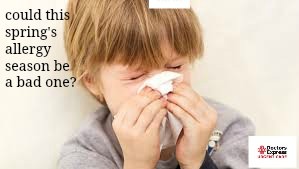
Could this spring’s allergy season be a bad one in West Hartford and the northeast? And if so, why?
If you are already sniffling and tearing up you are not alone. Experts predict the 2015 allergy season will be more severe than years past because of this years’ harsh winter and record breaking amounts of snow.
As the last of the snow melted, well into April in the northeast, an excessive amount of moisture filled the air, which in turn led to increased counts of mold and mold spores. Mold is a big allergic irritant, and so this year even people who aren’t normally allergic could experience seasonal allergy symptoms.
Dr. John Basso, chief of allergy and immunology at Nyack Hospital in New York, told USA Today “the prolonged moisture in some regions this winter may have laid the groundwork for a bad season.” Basso explained a warm, dry spring following a wet winter is a recipe for high pollen counts.
Some feel that global warming is considered to be partly responsible for the unpredictable shift as well, as the increased carbon dioxide and climate change stimulates pollen growth. This then makes pollen more prevalent and potent.
There are preventative measures you can take to alleviate some of the suffering which involve controlling your environment to the best of your ability:
- Avoid substances you’re allergic to, called allergens. If you’re allergic to pollen, for instance, avoid going outside on days when the pollen count is high
- Keep the air conditioner on in the car and in the house or office to filter the air
- Take frequent showers if the pollen count is high, especially after returning from outside
- Prevent allergens from making it past the front entry hall. When out in the yard or on a walk, remove clothes immediately upon re-entering your house, place in a plastic garbage bag and put directly into washing machine, not in a hamper. This is a big one
Of course if all else fails, our fall back is always treating allergies with over the counter medications such as Flonase nasal spray, or Clariton, Benadryl or Allegra, orally. If allergies are hampering your every day ability to function there are also steroidal medicines that we can prescribe.
Key here is not to wait. If you are an allergy sufferer, start early in the spring taking any medications before the onset of spring allergies, as they normally take a week to 10 days to become effective.
Basically, experts find sufferers are better off when they plan a preemptive strike against miserable symptoms.
If you are not sure if you are suffering from a cold or from seasonal allergies, come in to for an evaluation. We are here to help.